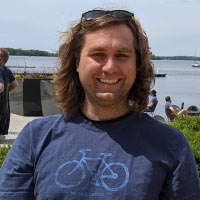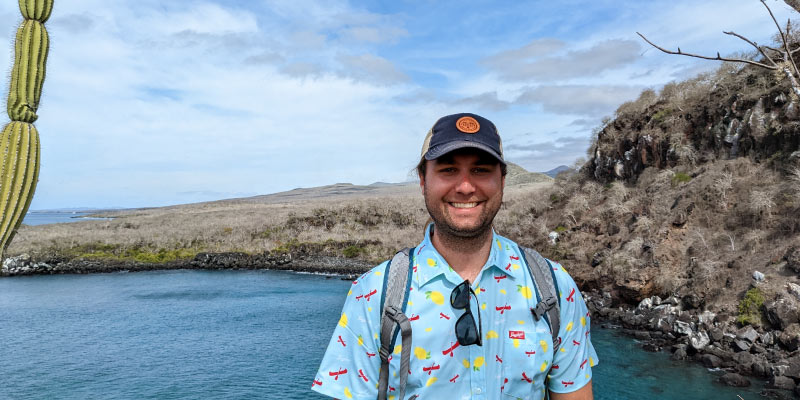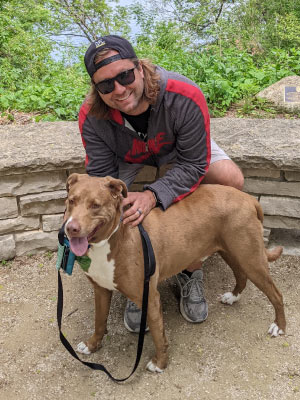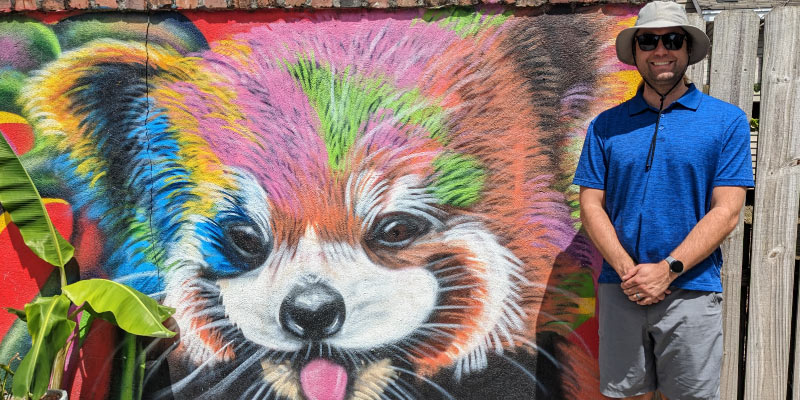
If Travis Blomberg is successful, only 10 percent of UW–Madison’s waste will end up in a landfill. It’s a lofty goal, to be sure, but the Nelson Institute graduate has already made impressive strides. As the campus resource coordinator at the Office of Sustainability, Blomberg pairs his environmental and economic backgrounds to enter the waste-reduction effort from a new angle: purchasing.
There are a great many things on the UW–Madison campus: boxes of printer paper in administrative offices, new carpeting in buildings, beakers and Bunsen burners in labs, dishes for scoops of Babcock ice cream. Everything is purchased from somewhere — and eventually, they all have to go elsewhere. Whether immediately after use or in 40 years when an old building comes down, “you have a point in which that item, material, or facility is no longer useful,” Blomberg says, “whether it’s reused, resold, recycled, digested, composted, or landfilled is up to us.”
When Blomberg joined the Office of Sustainability’s team in 2020, he was charged with developing an institution-wide zero-waste program. But anyone with a familiarity of the UW campus knows, based on its sheer size, how decentralized its operations can be. Blomberg is the connector: he looks at all the materials we have, zooms out to see the larger systems that they’re a part of, then starts connecting teams who interact with a product at each stage of its life cycle, from purchasing to delivering to installing to removing. “The goal,” he says, “is looking at it in a more cross-functional way, of bringing all these stakeholders together.”
Blomberg is well trained for pairing sustainability practices and business operations. He came to UW–Madison from Colfax, Wisconsin — which is actually 100-some miles closer to the University of Minnesota campus than the UW’s. He knew he wanted to study the environment, so when it came to choosing between the two schools, it was a simple decision: “The Nelson Institute is named after the founder of Earth Day, so that certainly helped,” Blomberg shrugs.
 The plan was to use his double-major of environmental studies and political science to pursue a career in environmental law, but a sustainable business class with emeritus lecturer Tom Eggert changed his mind. He thought that, as an environmental lawyer, he’d be playing a reactive role where problems and issues have already occurred. “Visions of battling industry polluters like John Travolta in A Civil Action comes to mind,” Blomberg says. Eggert’s class offered a new perspective. “How do you actually do all this preventative change on the upfront? Can businesses operate with a more socially and environmentally responsible mindset without sacrificing profit?” he remembers thinking. (Blomberg himself went on to found his own business with this mindset, the Strips Officiating Agency, which helped youth-sports games and tournaments hire referees — particularly refs who are young, former athletes like Blomberg.)
The plan was to use his double-major of environmental studies and political science to pursue a career in environmental law, but a sustainable business class with emeritus lecturer Tom Eggert changed his mind. He thought that, as an environmental lawyer, he’d be playing a reactive role where problems and issues have already occurred. “Visions of battling industry polluters like John Travolta in A Civil Action comes to mind,” Blomberg says. Eggert’s class offered a new perspective. “How do you actually do all this preventative change on the upfront? Can businesses operate with a more socially and environmentally responsible mindset without sacrificing profit?” he remembers thinking. (Blomberg himself went on to found his own business with this mindset, the Strips Officiating Agency, which helped youth-sports games and tournaments hire referees — particularly refs who are young, former athletes like Blomberg.)
He finished his undergraduate degree in 2012, then dove deeper into that question by enrolling in the Nelson Institute’s environment and resources master’s program, which he paired with a certificate in business, environment, and social responsibility through the Wisconsin School of Business.
While studying at Nelson, Blomberg kept a lot of irons in the fire. He continued his work with his Stripes Officiating Agency while also working as a sustainability intern with Lands’ End and a communications intern with Cool Choices, a Madison-based company that helps businesses make more sustainable choices.
After completing his master’s degree in 2015, Blomberg jumped right into the professional world. He started with a summer fellowship through the Environmental Defense Fund’s Climate Corps, which placed him with Transwestern Real Estate Service’s sustainability services team, headquartered in Milwaukee. That led to a full-time job with Transwestern as a sustainability advisor, where he worked with both the company and its external clients on sustainability practices. He then became the executive director for WasteCap Resource Solutions, a Milwaukee-based non-profit that provides waste reduction and recycling assistance for the benefit of businesses and the environment, before finding his way back to the UW–Madison campus for his current role in the Office of Sustainability.
 When he got back to campus as a professional, the landscape of campus sustainability looked much different than it did during his tenure as a student. For one, the Office of Sustainability didn’t exist while he was an undergrad and was only in its infancy through his graduate studies. Even the vernacular was different: “There was no ‘sustainability;’ that word wasn’t even used that much, if at all. It was ‘green,’ ” he remembers. The education around sustainability has changed, too. Now, there’s sustainability-focused academic certificates, including the Nelson Institute’s undergraduate sustainability certificate, and there’s a repository of all UW–Madison classes that have a sustainability component. And perhaps most recently, the effort to make campus a sustainable operation has risen in priority from a grassroots effort to one of Chancellor Jennifer Mnookin’s key initiatives.
When he got back to campus as a professional, the landscape of campus sustainability looked much different than it did during his tenure as a student. For one, the Office of Sustainability didn’t exist while he was an undergrad and was only in its infancy through his graduate studies. Even the vernacular was different: “There was no ‘sustainability;’ that word wasn’t even used that much, if at all. It was ‘green,’ ” he remembers. The education around sustainability has changed, too. Now, there’s sustainability-focused academic certificates, including the Nelson Institute’s undergraduate sustainability certificate, and there’s a repository of all UW–Madison classes that have a sustainability component. And perhaps most recently, the effort to make campus a sustainable operation has risen in priority from a grassroots effort to one of Chancellor Jennifer Mnookin’s key initiatives.
In support of the university’s invigorated efforts to save energy, reduce emissions, divert waste, and more, perhaps the largest project in Blomberg’s queue is leading the newly assembled UW Zero Waste Team through a three-stage program. As soon as Blomberg started his job — in June 2020, the first COVID summer — so did step one: completing an assessment. “A lot of time, I wasn’t even able to go on campus because of whatever new strain of COVID that was spreading,” he remembers. So from a square on his computer screen, Blomberg drew on his student experience — which conveniently included a class he’d taught with the Nelson Institute’s Cathy Middlecamp that used campus as a learning laboratory about sustainable operations — and assembled a team of cross-campus staff members to work on the assessment. With help from student interns in the Office of Sustainability, the zero-waste assessment was published in November 2021.
We can purchase less, but for the things that we do need to purchase, how do we make sure that we source them responsibly?” — Travis Blomberg
Enter stage two: strategic visioning, which wrapped up in spring 2023. In this stage, Blomberg’s team hosted meetings with stakeholders across campus who work with materials at each stage of their life cycle. “Based on this assessment,” they would ask, “let’s talk about the areas of improvement. What would it take for you or your team to do this operation better?” For Blomberg, the critical component of step two was “to give time and space to staff members who perform these jobs on a daily basis to come up with these ideas,” he explains, “and then utilize the Office of Sustainability as institutional-level managers to support it. In this way, we could collectively fit the puzzle pieces together.”
 Now it’s summer 2023, and Blomberg is leading his team through the final stage: action planning. This is where purchasing, infrastructure, and personnel all come into play. How do we achieve a goal of diverting 90 percent of our campus’s waste? By not only considering how we deal with what goes out, but how we select what comes in. “We can purchase less,” Blomberg explains, “but for the things that we do need to purchase, how do we make sure that we source them responsibly? Of the materials that we buy, how can we account for the full lifecycle of the product?”
Now it’s summer 2023, and Blomberg is leading his team through the final stage: action planning. This is where purchasing, infrastructure, and personnel all come into play. How do we achieve a goal of diverting 90 percent of our campus’s waste? By not only considering how we deal with what goes out, but how we select what comes in. “We can purchase less,” Blomberg explains, “but for the things that we do need to purchase, how do we make sure that we source them responsibly? Of the materials that we buy, how can we account for the full lifecycle of the product?”
If all of those questions leave you feeling a little overwhelmed, you’re not alone. “It’s always overwhelming,” Blomberg says, acknowledging that it’s easy to feel down sometimes. “Working with smart, ambitious students and staff members and faculty brings me hope that you can — and do — make a positive change.” And that’s certainly what this work is doing: in 2007, only about 27 percent of campus waste was diverted from a landfill; in 2021, more than 44 percent. At that improvement rate, and with Blomberg at the helm, campus will reach its goal in no time.
Travis Blomberg is one of six Nelson Institute alumni award winners. Their stories are featured throughout the Commons magazine and online.